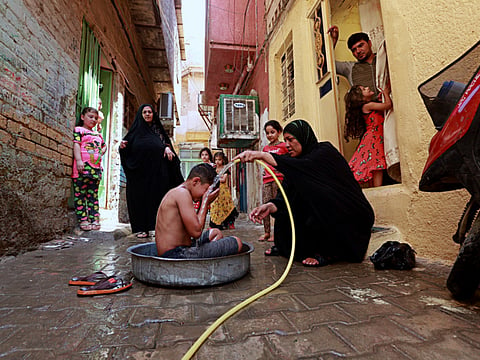Iraqi public sector get day off due to blistering heatwave
In some public places, showers and water spray cooling fans have been set up

Dubai: Iraqi Prime Minister Haider Al Abadi ordered all government staff to take Thursday off work because of exceptionally high temperatures.
Forecasters expect air temperatures in the capital, Baghdad, to reach 50C (122F) on Thursday afternoon.
Heatwave conditions are also expected in the cities of Basra and Mosul.
The extreme heat can cause chronic power shortages, depriving homes and businesses of electricity and air conditioning for parts of the day.
Near record temperatures are being experienced across the region and have also affected parts of Europe in recent weeks.
Scientists warn that extreme weather could lead to the deaths of 52,000 people yearly in Europe by 2100 if nothing is done to halt the effects of climate change.
Last week, Iraq’s weather service warned that temperatures would increase next week in most parts of the country, with the highs expected to reach 51 degrees Celsius, or about 124 degrees Fahrenheit, adding to the daily woes of Iraqi citizens already facing a deteriorated security situation and lack of public services.
The country typically faces brutal heat in the summers and endemic electricity outages make life even harder when temperatures soar. Those who can, escape to cooler spots in neighbouring countries, while those who can’t afford a trip abroad stay indoors or go swimming in the Tigris and Euphrates rivers.
In some public places, showers and water spray cooling fans have been set up for those who want to cool down, and some street vendors and taxi drivers keep wet handkerchiefs on their heads.
Carts for watermelon, ice cream and cold drinks are seen on almost every street corner.
The cities of Basra and Maysan saw the hottest temperatures in July, registering 52 degrees Celsius, or 125 Fahrenheit, last month.
Last year, temperatures reached 51 degrees Celsius (123.8 Fahrenheit) in Baghdad and as much as 53 degrees Celsius (127.4 Fahrenheit) in Basra, prompting the government to announce a two-day mandatory holiday.
Unlike other countries in the region, Iraq lacks tourism destinations where people can spend time to escape the sweltering heat, leaving the majority of Iraqis with limited options, such as travelling to the self-ruled northern Kurdish region or swimming in the rivers and irrigation canals or killing time inside air-conditioned shopping malls or staying inside the home.
Exacerbating their suffering is the shabby electricity situation, which in past years has led to protests, with some turning bloody after security forced opened fire.
The unmerciful heat and humidity in Basra has slashed by more than half the income of Hussain Hazim, a photographer who roams the city’s plazas and corniche.
“When summer comes, I stop roaming the streets even during the night,” the 42-year-old father of three said.
“Instead, I visit public halls to offer services for wedding parties, but can’t secure a steady income with that,” he added.
Vacationers who can afford to travel abroad, have a variety of options, said Mustafa Jawad, the marketing manager at a leading travel and tourism agency in Baghdad.
Mustafa’s Al Merjan Agency offers group tours not only to neighbouring countries, but also to destinations in Europe, Asia and the Maldives.
“Every summer, turnout is very high from those who want to escape the heat especially when temperatures exceed 50 degrees Celsius,” Jawad said. “The most popular destinations for Iraqis are Turkey, Azerbaijan, Russian and Belarus as they are not far and the costs affordable by the majority of Iraqis,” he added.
Basra resident, Faiq Abdul Karim is among those planning to flee Basra in the coming days for Turkey.
Even with the suffering, many Iraqis retain their sense of humour. In one cartoon published on social media, the map of Iraq is depicted being fried in a pan by the sun and another picture shows a man sleeping on the roof of his home while clutching an ice block to his chest.
—With inputs from agencies


